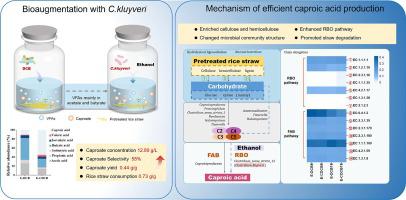当前位置:
X-MOL 学术
›
Bioresource Technol.
›
论文详情
Our official English website, www.x-mol.net, welcomes your feedback! (Note: you will need to create a separate account there.)
Efficient caproic acid production from lignocellulosic biomass by bio-augmented mixed microorganisms
Bioresource Technology ( IF 11.4 ) Pub Date : 2024-03-08 , DOI: 10.1016/j.biortech.2024.130565 Tianshu Liu , Jianzheng Li , Xinyu Hao , Jia Meng
Bioresource Technology ( IF 11.4 ) Pub Date : 2024-03-08 , DOI: 10.1016/j.biortech.2024.130565 Tianshu Liu , Jianzheng Li , Xinyu Hao , Jia Meng

|
Producing caproic acid via carboxylate platform is an environmentally-friendly approach for treating lignocellulosic agricultural waste. However, its implementation is still challenged by low product yields and selectivity. A microbiome named cellulolytic acid-producing microbiome (DCB), proficient in producing cellulolytic acid, was successfully acquired and shows promise for producing high-level caproic acid. In this study, a bioaugmentation method utilizing is proposed to enhance caproic acid yield of DCB using rice straw. With exogenous ethanol, bioaugmentation with significantly improved the caproic acid concentration and selectivity by 7 times and 4.5 times, achieving 12.9 g/L and 55.1 %, respectively. The addition of introduced reverse β-oxidation pathway, a more efficient caproic acid production pathway. Meanwhile, bioaugmentation enriched the bacteria proficient in degrading straw and producing short-chain fatty acids, providing more substrates for caproic acid production. This study provides potential bioaugmentation strategies for optimizing caproic acid yield from lignocellulosic biomass.
中文翻译:

通过生物增强混合微生物从木质纤维素生物质高效生产己酸
通过羧酸盐平台生产己酸是处理木质纤维素农业废物的一种环保方法。然而,其实施仍面临产品产量和选择性低的挑战。成功获得了一种名为产纤维素酸微生物组(DCB)的微生物组,该微生物组能够熟练地产生纤维素酸,并显示出生产高水平己酸的前景。在这项研究中,提出了一种利用稻草提高 DCB 己酸产量的生物强化方法。使用外源乙醇,生物强化显着提高了己酸浓度和选择性,分别提高了7倍和4.5倍,分别达到12.9 g/L和55.1 %。添加引入的反向β-氧化途径,一种更有效的己酸生产途径。同时,生物强化富集了擅长降解秸秆并产生短链脂肪酸的细菌,为己酸生产提供了更多底物。这项研究为优化木质纤维素生物质的己酸产量提供了潜在的生物强化策略。
更新日期:2024-03-08
中文翻译:

通过生物增强混合微生物从木质纤维素生物质高效生产己酸
通过羧酸盐平台生产己酸是处理木质纤维素农业废物的一种环保方法。然而,其实施仍面临产品产量和选择性低的挑战。成功获得了一种名为产纤维素酸微生物组(DCB)的微生物组,该微生物组能够熟练地产生纤维素酸,并显示出生产高水平己酸的前景。在这项研究中,提出了一种利用稻草提高 DCB 己酸产量的生物强化方法。使用外源乙醇,生物强化显着提高了己酸浓度和选择性,分别提高了7倍和4.5倍,分别达到12.9 g/L和55.1 %。添加引入的反向β-氧化途径,一种更有效的己酸生产途径。同时,生物强化富集了擅长降解秸秆并产生短链脂肪酸的细菌,为己酸生产提供了更多底物。这项研究为优化木质纤维素生物质的己酸产量提供了潜在的生物强化策略。



























 京公网安备 11010802027423号
京公网安备 11010802027423号